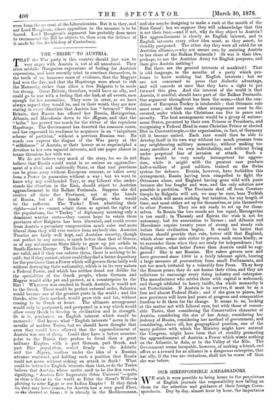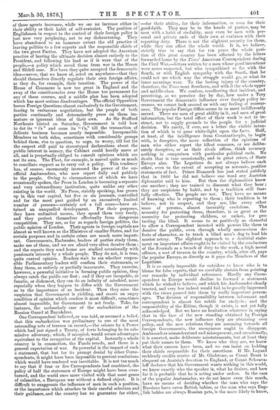OUR IRRESPONSIBLE AMBASSADORS.
WE wish it were possible to bring home to the proprietors of English journals the responsibility now falling on them for the selection and guidance of their foreign Corre- spondents. Day by day, almost hour by hour, the importance of these agents increases, while we see no increase either in their ability or their habit of self-restraint. The position of Englishmen in respect to the control of their foreign policy is just now very perplexing, not to say disheartening. They have abandoned to an immense extent the old practice of leaving politics to a few experts and the responsible chiefs of the two great Parties. They have not adopted the American practice of leaving the ultimate decision almost entirely to the President, and following his lead as if it were that of the people,—a policy which saved them from war in the Mason and Slidell case. Nor have they quite accepted the democratic idea—never, that we know of, acted on anywhere—that they should themselves directly regulate their own foreign affairs, as they do, for example, their taxation. The power of the House of Commons is now too great in England and the sway of the constituencies over the House too permanent for any of these courses, and a middle plan has been adopted which has most serious disadvantages. The official Opposition leaves Foreign Questions almost exclusively to the Government, fearing to embarrass negotiation, but the people of both parties continually and determinedly press on them im- mature or ignorant ideas of their own. As Sir Stafford Northcote hinted on Saturday, Government is told how to dot its " i's " and cross its " t's," till the transaction of delicate business becomes nearly impossible. Irresponsible Members on both sides, sometimes with considerable groups behind them, rise to question, to urge, to worry, till but for the respect still paid to stereotyped declarations about the public interest in secrecy, the Cabinet could hardly move at all, and is perpetually obliged to consult opinions which are not its own. The Fleet, for example, is moved quite as much to conciliate support as to carry out a policy. This tendency has, of course, enormously increased the power of the un- official Ambassadors, who now report daily and publicly to the people. Owing to circumstances of which we have occasionally spoken, the Press in London is becoming a separate and very extraordinary institution, quite unlike any other existing in the world. No Press, strictly speaking, has grown up in this vast capital, but five or six journals, controlled and for the most part guided by an excessively limited number of persons—certainly not a full score—have at- tained an unequalled development. For their purposes, they have unlimited means, they spend them very freely, and they protect themselves effectually from dangerous competition. They are, as far as regards foreign politics, the public opinion of London. Their agents in foreign capitals are almost as well known as the Ministers of smaller States, and for certain purposes and in certain crises are much more import- ant. Governments, Embassies, leaders of parties study them, make use of them, and we are afraid very often deceive them ; and the reports they send home are studied occasionally with passionate interest by a whole people. They do not, it is true, quite control opinion. Readers wait to see whether respon- sible Parliamentary leaders will confirm their statements, or deny them, as entirely or partially inaccurate. They exercise, however, a powerful initiative in forming public opinion, they always catch the public ear first ; and if they are incapable, or fanatic, or dishonest, they can do an infinity of mischief, more especially when they happen to differ with the Government as to the importance of an incident. Then they raise the suspicion that Government is yielding, and create an angry condition of opinion which renders it most difficult, sometimes almost impossible, for Government to act freely. Take, for instance, the melancholy case of the embarkation of the Russian Guard at Buyukdere.
One Correspondent believed, or was told, or assumed a belief, that this embarkation was preliminary to one of the most astounding acts of treason on record,—the seizure by a Power which had just signed a Treaty, of forts belonging to its sub- missive adversary, which, if occupied, would secure advantages equivalent to the occupation of the capital. Instantly a whole country is in commotion, the Funds recede, and there is a general expectation of war. So powerful is the impact of such a statement, that but for its prompt denial by other Corre- spondents, it might have been impossible to prevent resolutions which would have rendered war inevitable. It is not too much to say that if four or five Correspondents had combined, the policy of half the statesmen of Europe might have been over- turned, and the world once more visited with that most grave of calamities, a European war without a defined object. It is difficult to exaggerate the influence of men in such a position, or the importance which attaches to their careful selection and their guidance, and the country has no guarantee for either, —for their ability, for their information, or even for their good-faith. They may be in the hands of parties, may be men with a habit of credulity, may even be men with per- sonal and private ends of their own at variance with their reporting duty. There is not the slightest security for them, while they can affect the whole world. It is, we believe, strictly true to say that for ten years the whole posi- tion of this great country has been affected by the letters forwarded home by the Times' American Correspondent during the Civil War,—letters written by a man whose good intentions were never suspected, but who sympathised so far with the South, or with English sympathy with the South, that he could not see which way the struggle would go, or what its inner meanings were. To the lasting injury of the country, therefore, the Times went Southern, and with it the whole upper and middle-class. We confess, recollecting that incident, and perceiving, as we perceive day by day, how under a Tory Government the democratic influence over foreign policy in- creases, we cannot look around us with any feeling of reassur- ance. The popular Foreign Office seems to us most indifferently served. There are men of great ability in it, and men of great information, but the total effect of their work is not to in- struct, not to supply grounds to the people for a judicial decision. We rarely, if ever, see a letter the visible inten- tion of which is to pour white-light upon the facts. Half, at least, of the intelligence from Constantinople, to begin with, is deceptive, the mere reflection of the opinions of men who either report the idlest rumours, or are delibe- rately deceptive, or as their rivals affirm. think accuracy nothing in comparison with particular political ends. No doubt that is true occasionally, and in great crises, of State Envoys also. The Legations do not always believe each other, even to the extent of accepting as accurate, positive statements of fact. Prince Bismarck has just stated publicly that in 1866 he did not believe one word any Austrian diplomatist said to him. But then the diplomatists know one another ; they are trained to discount what they hear ; they are suspicious by habit, and by a tradition still fear- fully effective. The people are not. They have no means of knowing who is reporting to them ; their tradition is to believe, not to suspect, and they are, like every other mass of persons, almost incurably credulous. The necessity for protecting them, therefore, is as great as the necessity for protecting children, or rather, for pro- tecting the blind. It seems to us positively as shameful to allow a Correspondent invested with powers like these to deceive the public, even through wholly unconscious de- fects of character, as to teach a blind man's dog to lead his master astray. The slightest approach to a doubtful state- ment on important affairs ought to be visited by the conductors of the Journals as a breach of duty to the work, a high moral offence, a sort of treason to the country, which, after all, pays the popular Envoys, as directly as it pays the Members of the Legations. It is so nearly impossible for outsiders to know who is to blame for false reports, that we carefully abstain from pointing our remarks by individual references. Hardly any Corre- spondent in Europe would decline to forward a statement which he wished to believe, and which his Ambassador clearly trusted, and very few indeed would fail to be greatly impressed with the views poured into them by really important person- ages. The division of responsibility between informant and correspondent is almost too subtle for analysis ; and the responsibility of the Editor, though it exists, is not yet fully acknowledged. But we have no hesitation whatever in saying that in the face of the new standing obtained by Foreign Correspondents, the new influence they are obtaining over policy, and the new relations they are assuming towards all foreign Governments, the anonymous ought to disappear. Ambassadors misunderstand and misrepresent, and occasionally, it is asserted, make deliberate misstatements, but at least they put their names to them. We know who they are, we know what their careers have been, and we can insist on holding their chiefs responsible for their assertions. If Mr. Layard recklessly credits stories of Mr. Gladstone, or Count Beust is eloquent on Austria's devotion to England, or Count Schouva- loff declares that his Government wants nothing in this world, we know exactly who the speaker is, what he desires, and how far it is probable that he is acting under orders. In the case of the popular Ambassador, we do not know even this much, have no means of deciding whether the man who says the Russians have eaten British babies, or the man who says Eng- lish babies are always Russian pets, is the more likely to know,
or the more worthy to be trusted. That is an unsafe position, and until it is altered, all readers ought to load with responsi- bility the conductors of journals whose Correspondents make serious statements discovered afterwards to be false.




































 Previous page
Previous page